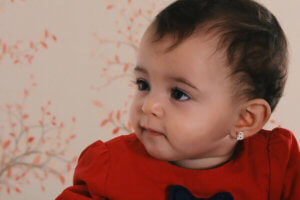Herpes in the mouth often occurs in younger children and rarely in adults. Children suffer from painful small blisters in the mouth and throat. How this form of herpes develops and what helps against it, you will learn here.
Table of contents
What Is Herpes In The Mouth?
Herpes in the mouth is also called stomatitis aphtosa, gingivostomatitis or oral thrush. Behind the term “herpes” are a variety of viruses. In this case, small painful blisters form, as in the classic lip or nose herpes. Herpes in the mouth is called herpes simplex virus, type 1. This form of herpes belongs to the oral strain and often occurs only with an initial infection. The inflammation can affect the entire oral mucosa, pharynx and even throat.
- Also interesting:
- The best winter shoes for children
- Recommended wall stickers for children
- The best kettles
Who Does Herpes In The Mouth Affect?
Herpes simplex virus 1 spreads in the lip region, but also inside the mouth and oral mucosa. The infection most often occurs in children before the age of five.
Adults are less commonly affected. However, a weak immune system in adults may contribute for the infection of herpes in the mouth. To avoid acute herpes virus infection, make sure your own child doesn’t infect another child.
Causes Of Herpes: Why Do Children Get Infected More Often?
Herpes in the mouth is contagious and is usually transmitted through droplet infection or smear infection. The corner of the mouth and the lip of children have preferred entry sites for viruses. Because the skin is relatively thin and has small cracks in these areas, viruses enter the body more easily. Young children also often touch their faces, so viruses easily pass from mouth to hand and from there to the next child.
Bacteria on toys can survive for up to two days and are other carriers. In this type of smear infection, viruses are transmitted from sick children to other children. Disgust, fright or fear can also be a trigger for herpes in the mouth in young children. For these reasons, herpes in the mouth spreads especially easily among children. You should therefore take care that your child does not infect other children or is infected by other young children. You also should not infect your child in case of a herpes infection.
Symptoms Of Herpes In The Mouth
The initial infection manifests itself in the form of mouth sores. Here, in addition to the painful inflammation of the mucous membrane of the mouth, there may also be signs of general ill feeling. The symptoms begin a few days before the outbreak of herpes or only hours before. During the outbreak, the symptoms additionally persist. Herpes in the mouth is extremely uncomfortable and causes severe pain. Children are restless and are impaired in drinking and eating.
The symptoms of a first-time herpes virus are much more pronounced. The signs of illness fever, chills, headache, aching limbs and fatigue are the first early symptoms.
The main symptoms, however, are inflammation of the entire oral mucosa. Salivation as well as redness and swelling on the tongue, gums and the inside of the cheeks are typical signs of herpes. The front of the mouth, including the gums, is usually severely affected.
Duration Of Herpes In The Mouth
The duration of herpes virus infection is from three to nine days, but it can last up to six weeks. An active herpes simplex virus 1 is always contagious as long as viruses are shed by the body. This means that the more viruses that are shed, the greater the risk of transmission. If your child comes into contact with the virus at a young age, it can reappear at any time.
Herpes In Young Children: Dangerous Or Not?
The herpes virus is usually not dangerous in infants and heals on its own. However, care must be taken with newborns, as their organs are still susceptible to the virus. In both cases it would be advisable to consult a doctor.
Treatment: What Helps With Herpes In The Mouth?
In general, a herpes outbreak cannot be completely avoided. However, medical treatment can reduce the pain of herpes in the mouth. For this, a general medical practice, practices for pediatrics or dermatologists can be visited. After examining the contents of the blister or taking a swab, the doctor may prescribe various medications.
How Do You Protect Your Child From Herpes?
Here’s what to look for to protect your child and other children from oral herpes.
- Clean saliva residues from toys.
- wash hands thoroughly.
- do not bite fingernails.
- do not rub eyes.
- detailed oral hygiene.
What Should Be Avoided With Herpes?
How it is transmitted.
- Smear infection (sharing glasses and cutlery, toys, towels, napkins).
- Droplet infection (sneezing, coughing, talking).
- Close physical contact (kissing, hugging, touching the blisters).
No Need To Worry
You are worried about your child, this is understandable. If your child is not well, you automatically suffer with him. Herpes in small children usually heals after about a week without any consequences. A recurrence of the herpes simplex virus 1 is unlikely. As the aphthae heal, your child’s pain will also go away.
During the time the virus is present, it is important to take certain precautions. You should make sure that your own child does not infect other children. Be it through smear infection or droplet infection.
Sources
https://www.brigitte.de/gesund/gesundheit/herpes-im-mund–ursachen-und-die-besten-tipps-11627076.html
https://www.heilpraxisnet.de/symptome/herpes-im-mund.html
https://www.apotheken-umschau.de/Lippenherpes
https://www.netdoktor.de/krankheiten/herpes/im-mand/
https://www.brigitte.de/gesund/gesundheit/herpes-im-mund–ursachen-und-die-besten-tipps-11627076.html












